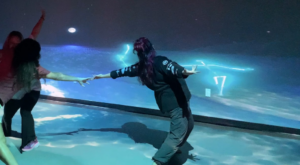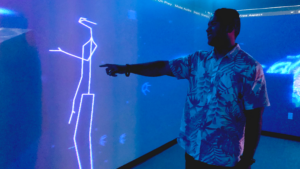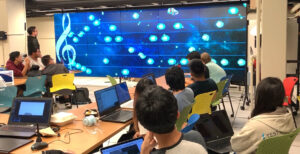Campus Overview
Founded in 1907, the University of Hawaiʻi at Mānoa is the flagship campus of the University of Hawaiʻi System. A destination of choice, students and faculty come from across the nation and the world to take advantage of UH Mānoa’s unique research opportunities, diverse community, nationally-ranked Division I athletics program, and beautiful landscape. Consistently ranked a “best value” among U.S. colleges and universities, our students get a great education and have a unique multicultural global experience in a Hawaiian place of learning—truly like no place else on earth.
The University of Hawaiʻi at Mānoa is accredited by the Senior Commission of the Western Association of Schools and Colleges (WASC). WASC, one of six regional accrediting agencies recognized by the U.S. Department of Education, evaluates and accredits schools, colleges, and universities in California, Hawaiʻi, and the Pacific Islands. UH Mānoa has been fully accredited since 1955.
Click here to learn more about the various media programs across the UH System supported by the Academy for Creative Media System
Academic PathwaysTo learn more about the UH Mānoa campus click here
UH MānoaAmbient Computing Lab
Prerequisites
N/A
Core Requirements
N/A
Electives
N/A
Program Overview
The Ambient Computing Laboratory at the University of Hawai’i at Mānoa’s College of Engineering develops advanced cyber-physical systems that combine interactive multimedia with the unique research possibilities offered by the billions of connected devices that are increasingly connected to the Internet. This evolution of the Internet, known as the Internet of Things (IoT), is well underway, with the current 20 billion connected devices projected to surpass 75 billion devices by the year 2025.
The Ambient Lab’s research focuses on several Hawai’i-specific needs, such as remote collaboration, distance education and connected healthcare. Together with UH System’s Academy for Creative Media (ACM System), the lab also helps foster UH’s emerging Computational Media study program, which trains students and working professionals in the areas of video game development, virtual and augmented reality, and digital storytelling and filmmaking.
Recognizing the strategic value of this ongoing digital transformation, ACM System’s Founder and Director, Chris Lee, has spent over fifteen years developing Hawai’i as a center of excellence in media. Lee, who previously served as president of production for both TriStar Pictures and Columbia Pictures, established ACM System in 2003 to promote integrated multimedia, arts, and technology education in Hawai’i as a catalyst for creating 21st century knowledge-based jobs across the islands. Lee has been instrumental raising the public and private capital needed to fund its activities, building initiatives, and attracting visionary researchers—like Carlson to UH in 2016.
Carlson’s appointment complements ACM System’s ongoing support of UH Professor Jason Leigh’s Laboratory for Advanced Visualization & Applications (LAVA) at UH Mānoa. Since 2014, LAVA has served as a dynamic maker space and innovation hub at UH, where researchers develop a wide range of big data visualization techniques for science, engineering and training. LAVA also forms the core of the Hawai’i Data Science Institute, which serves the data intensive science, engineering and training needs of UH System’s 10 campuses.
For more info about UH Mānoa’s program, please visit their site.
BA and BS in Creative Computational Media
Prerequisites
N/A
Core Requirements
Bachelors of Arts Requirements:
ICS Related Requirements (7-8 credits)
MATH 215 – Applied Calculus I or MATH 241 – Calculus I or MATH 251 – Accelerated Calculus I (prerequisite for ICS 141 – Discrete Mathematics for Computer Science I)
MATH 216 – Applied Calculus II or MATH 242 – Calculus II or MATH 252A – Accelerated Calculus II (prerequisite for ICS 311)
MATH 215 or 241 or 251A is a prerequisite for MATH 242. However, students must meet the grade requirement B (not B-) in MATH 215 to enroll in MATH 242.
MATH 241 or 251A is a prerequisite for MATH 252A. However, students must meet the grade requirement B (not B-) in MATH 241 and receive consent to enroll in MATH 252A.
ICS Core Courses (49 credits)
ICS 110D – Introduction to Computer Programming Through Animations
ICS 111 – Introduction to Computer Science I
ICS 211 – Introduction to Computer Science II
ICS 212 – Program Structure
ICS 235 – Machine Learning Methods (Fall only)
ICS 311 – Algorithms (Substitution allowed: EE 367 can be a substitution for ICS 311)
ICS 314 – Software Engineering
ICS 321 – Database Systems
ICS 355 – Security and Trust I
ICS 369 – Computational Media Systems
ICS 481 – Introduction to Computer Graphics
ICS 487 – Digital Content Creation I
MATH 301 – Introduction to Discrete Mathematics
MATH 307 – Linear Algebra
MATH 372 – Elementary Probability & Statistics
Bachelors of Science Requirements
ICS Related Requirements (7-8 credits)
To enroll in all courses requiring Calculus II as their prerequisite (ICS 311, MATH 307, and MATH 372), students must take MATH 242 or 252A for their Calculus II requirement.
MATH 215 or MATH 241 or MATH 251A (Calculus I) is a prerequisite for MATH 242. However, students must meet the grade requirement B (not B-) in MATH 215 to enroll in MATH 242.
MATH 241 or MATH 251A (Calculus I) is a prerequisite for MATH 252A. However, students must meet the grade requirement B (not B-) in MATH 241 and receive consent to enroll in MATH 252A.
ICS Core Courses (56 credits)
ICS 110D – Introduction to Computer Programming Through animations
ICS 111 – Introduction to Computer Science I
ICS 211 – Introduction to Computer Science II
ICS 212 – Program Structure
ICS 235 – Machine Learning Methods (Fall only)
ICS 311 – Algorithms (Substitution allowed: EE 367 can be a substitution for ICS 311)
ICS 314 – Software Engineering
ICS 321 – Database Systems
ICS 355 – Security and Trust I
ICS 369 – Computational Media Systems
ICS 481 – Introduction to Computer Graphics
ICS 487 – Digital Content Creation I
ICS 488 – Digital Content Creation II
ICS 496 – Capstone Project
MATH 301 – Introduction to Discrete Mathematics
MATH 307 – Linear Algebra
MATH 372 – Elementary Probability & Statistics
Electives
Bachelors of Arts Elective Courses (12-13 credits)
ICS 419 – The Science, Psychology and Philosophy of Systems Design
ICS 464 – Human Computer Interaction I
ICS 481 – Introduction to Computer Graphics
ICS 482 – Topics in Computer Graphics
ICS 484 – Data Visualization
ICS 485 – Video Game Design
ICS 486 – Virtual and Augmented Reality
ICS 487 – Digital Content Creation I
ICS 488 – Digital Content Creation II
ICS 489 – Software Techniques for Computer Visual Effects
ICS 496 – Capstone Project
Bachelors of Science Elective Courses (6 credits)
ICS 419 – The Science, Psychology and Philosophy of Systems Design
ICS 464 – Human Computer Interaction I
ICS 481 – Introduction to Computer Graphics
ICS 482 – Topics in Computer Graphics
ICS 484 – Data Visualization
ICS 485 – Video Game Design
ICS 486 – Virtual and Augmented Reality
ICS 487 – Digital Content Creation I
ICS 489 – Software Techniques for Computer Visual Effects
Program Overview
With the support of the Academy for Creative Media System, the Information and Computer Sciences department (ICS) offers a Bachelor’s of Arts and Bachelor’s of Science in Creative Computation Media (CCM).
The program provides students and industry professionals with training centered on the application of computing in immersive media job markets, such as video game and eSports design and development, digital film production and special effects, new media theater and dance performance, interactive digital media installation development, and exhibit design for museums, theme parks, or marketing/advertising.
For more info about UH Mānoa’s program, please visit their site.
Contact an Advisor
Guylaine Poisson
POST 303C
808-956-3496
guylaine@hawaii.edu
ICS – Computer Science
Prerequisites
Visit the ICS undergraduate degree website for more information.
Core Requirements
Visit the ICS undergraduate degree website for more information.
Electives
Visit the ICS undergraduate degree website for more information.
Program Overview
The Information and Computer Sciences Department (ICS) at the University of Hawaiʻi at Mānoa offers the following ACM-related courses:
- Video Game Design and Development
- Artificial Intelligence for Games
- Data Visualization
- Human Computer Interaction
- Introduction to Computer Graphics
ACM students may take these classes by contacting the respective professor and asking for a permission override.
Contact an Advisor
ACM liaison for ICS is Professor Jason Leigh
E-mail: leighj@hawaii.edu
ICS contact for undergraduate degree requirements:
Gerald Lau
Assistant Faculty Specialist (ICS/LIS)
Office: POST 303A
Phone: 808-956-5428
E-mail: glau@hawaii.edu
Computer Engineering
Prerequisites
Core courses cover the fundamentals of electrical and computer engineering, while upper level technical elective courses allow students to pursue their specific technical interests. The program emphasizes hands-on education with state-of-the-art equipment and software tools. There are three required project courses, one each at the sophomore (EE 296), junior (EE 396), and senior (EE 496) levels.
In the Electrical Engineering program, the electives are divided into two major areas or Tracks:
- Electrophysics Track
- antennas, circuit/device designs, electromagnetic, electronics, fabrication, microwave engineering, optics, solid-state devices, and sensors.
- Systems & Data Science Track
- control, data science, convolutional neural networks, machine learning, optimization, pattern recognition, signal/image processing, and telecommunications.
Electrical Engineering program students may also opt to take a select set of courses to receive a concentration in
- Biomedical Concentration
- Energy Concentration
Core Requirements
Each of the curricula offered by the College of Engineering provides a fundamental science-oriented university education with coverage of communications, the humanities, and social sciences, as well as the basic physical sciences of mathematics, physics, and chemistry. The curricula also encompass engineering sciences common to all engineering disciplines and project courses that introduce the engineering method of design.
Course work in each curriculum consists of a set of required courses common to all engineering majors and additional courses to satisfy departmental requirements. The college participates actively in UH Mānoa Honors Program. The courses required of all engineering students, which also satisfies the General Education Core Requirements of UH Mānoa, consist of the following credits:
Written Communication
ENG 100 – Composition I (3) (FW) or approved FW course
Arts, Humanities and Literature
COMG 251 – Principles of Effective Public Speaking (3) (DA)
One elective (3) (DH or DL)
Social Sciences
ECON 120 – Introduction to Economics (3), ECON 130 – Principles of Microeconomics (3), or ECON 131 – Principles of Macroeconomics (3) (DS)
One elective (3) (DS)
Global and Multicultural Perspectives
Two approved FG electives (6)
Symbolic
MATH 241 – Calculus I (4) (FS)
MATH 242 – Calculus II (4)
MATH 243 – Calculus III (3)
MATH 244 – Calculus IV (3)
or
MATH 251A – Accelerated Calculus I (4)
MATH 252A – Accelerated Calculus II (4)
MATH 253A – Accelerated Calculus III (4)
Natural Sciences
CHEM 161/161L, and CHEM 162 – General Chemistry/Lab (3/1/3) (DP/DY)
or
CHEM 171/171L – Principles of Chemistry (4/1) (DP/DY)
or
CHEM 181/181L – Principles of Chemistry (4/1) (DP/DY)
and
PHYS 170/170L – General Physics I/Lab (4/1) (DP/DY)
PHYS 272/272L – General Physics II/Lab (3/1) (DP/DY)
Additionally, a student must complete the Focus Graduation Requirements: one H, one E, one O, and five W courses. The Hawaiian or Second Language is not required for the engineering degree.
Electives
There is a requirement of a minimum of 6 credit hours of technical electives. They may be all from the following list of EE and ICS courses. Alternatively, they may be composed of 3 credit hours from the list and 3 credit hours of an EE course that is at the 300 level or higher.
EE 344 Network I (or ICS 451)
EE 406 Introduction to Computer and Network Security
EE 449 Computer Communication Networks (or ICS 451)
EE 461 Computer Architecture (or ICS 431)
EE 467 Object Oriented Software Engineering
EE 468 Introduction to Operating Systems (or ICS 412)
EE 469 Wireless Data Networks
EE 491 Special Topics in Electrical Engineering (E, F, G)
ICS 311 Algorithms
ICS 313 Programming Language Theory
ICS 321 Data Storage & Retrieval
ICS 413 Software Engineering I
ICS 414 Software Engineering II
ICS 415 Introduction to Programming for the Web
ICS 421 Database Systems
ICS 424 Application Frameworks
ICS 425 Computer Security and Ethics
ICS 426 Computer System Security
ICS 432 Concurrent and High-Performance Programming
ICS 441 Theory of Computation
ICS 442 Analytical Models and Methods
ICS 461 Artificial Intelligence I
ICS 464 Human Computer Interaction I
ICS 465 Introduction to Hypermedia
ICS 466 Design for Mobile Devices
ICS 469 Introduction to Cognitive Science
ICS 481 Introduction to Computer Graphics
Note that ICS courses from the list may have prerequisite courses that are not part of the computer engineering curriculum. These courses used as technical electives will lead to more credit hours to complete the program.
Program Overview
The Electrical & Computer Engineering department at the University of Hawai’i at Mānoa was formed in 1959 with a baccalaureate degree program. The first graduating class received a B.S. degree in 1961. Our M.S. degree program was started in 1961, and our doctoral (Ph.D.) degree program was initiated in 1966. The first Ph.D. degree in Electrical Engineering was granted by the University in 1969. The famous wireless communication protocol, ALOHA, was invented by our faculty in the 1970s.
The Department of Information and Computer Sciences and the Department of Electrical Engineering offer a joint Bachelor of Science degree in Computer Engineering (BS CE). The BSCE degree program provides you with the opportunity to learn about computer hardware and software, computer organization and architecture, computer security, software engineering, computer networks and Internet technology, embedded systems, computer-aided design, multi-core and parallel computing, wireless networks, and other topics.
As an electrical or computer engineer, you will work at the heart of the most rapidly developing technology humankind has ever seen. Electrical engineers design and build electronic devices, process data and signals, sense things, control things, power things, and connect things and people, and lots more! Electrical engineering is one of the broadest of all engineering degrees, allowing students to move into virtually any area. Computer engineering is a discipline that combines electrical engineering with computer science, training students to have good understanding in both hardware and software. Electrical and computer engineering are among the top requested majors by potential employers.
The Department of Electrical & Computer Engineering offers:
- Bachelor of Science degree in Electrical Engineering
- Bachelor of Science degree in Computer Engineering (jointly with Department of Information and Computer Sciences)
For more information, please visit their site.
Contact an Advisor
Electrical & Computer Engineering
2540 Dole Street, Holmes Hall 483
Honolulu, HI 96822 USA
(808) 956-7586




